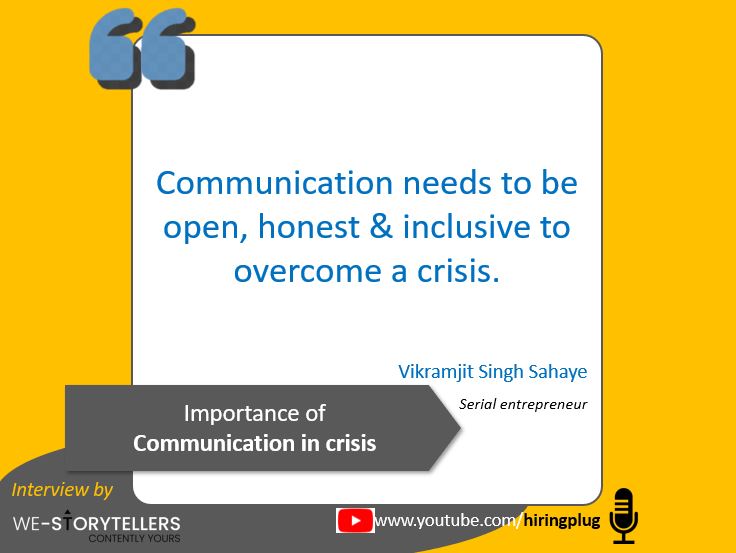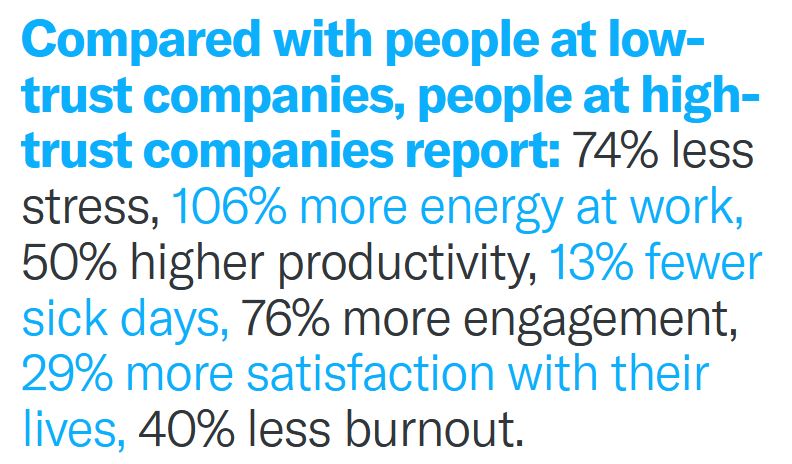Is "Trust" a rare commodity? Neuroscience has clear evidence of how Trust is induced and its impact. High-trust companies hold people accountable, while still giving discretion at work.
“The first responsibility of a leader is to define reality. The last is to say thank you. In between the two, the leader must become a servant.” - Max De Pree
Eight management behaviors that foster "Trust"
1. Recognize excellence
The neuroscience shows that recognition has the largest effect on trust when it occurs immediately after a goal has been met, when it comes from peers, and when it’s tangible, unexpected, personal, and public. Public recognition not only uses the power of the crowd to celebrate successes, but also inspires others to aim for excellence. And it gives top performers a forum for sharing best practices, so others can learn from them.
2. Induce “challenge stress.”
When a manager assigns a team a difficult but achievable job, the moderate stress of the task releases neurochemicals, including oxytocin and adrenocorticotropin, that intensify people’s focus and strengthen social connections. When team members need to work together to reach a goal, brain activity coordinates their behaviors efficiently. But this works only if challenges are attainable and have a concrete end point; vague or impossible goals cause people to give up before they even start. Leaders should check in frequently to assess progress and adjust goals that are too easy or out of reach.
3. Give people discretion in how they do their work.
Once employees have been trained, allow them, whenever possible, to manage people and execute projects in their own way. Being trusted to figure things out is a big motivator: A 2014 Citigroup and LinkedIn survey found that nearly half of employees would give up a 20% raise for greater control over how they work. Autonomy also promotes innovation, because different people try different approaches. Oversight and risk management procedures can help minimize negative deviations while people experiment. And postproject debriefs allow teams to share how positive deviations came about so that others can build on their success.
4. Enable job crafting.
When companies trust employees to choose which projects they’ll work on, people focus their energies on what they care about most. Allow people to freely self-organize into work groups while being accountable. Clear expectations and 360-degree evaluations reman vital to measure individual contributions.
5. Share information broadly.
Openness is the antidote. Organizations that share their “flight plans” with employees reduce uncertainty about where they are headed and why. Uncertainty about the company’s direction leads to chronic stress, which inhibits the release of oxytocin and undermines teamwork. Ongoing communication is key, especially during a crisis such as the Pandemic.
6. Facilitate wholistic growth.
Mentoring & Life coaching is important. High-trust workplaces help people develop personally as well as professionally. Numerous studies show that acquiring new work skills isn’t enough; if you’re not growing as a human being, your performance will suffer. High-trust companies adopt a growth mindset when developing talent. Assessing personal growth includes discussions about work-life integration, family, and time for recreation and reflection. Investing in the whole person has a powerful effect on engagement and retention.
7. Show vulnerability.
Leaders in high-trust workplaces ask for help from colleagues instead of just telling them to do things. Asking for help is a sign of a secure leader—one who engages everyone to reach goals.It taps into the natural human impulse to cooperate with others.
8. The Return on Trust
Test the impact of trust on business performance. The effect of trust on self-reported work performance is powerful. Trust has a major impact on employee loyalty as well.
It is found that those working in high-trust companies enjoy their jobs 60% more, are 70% more aligned with their companies’ purpose, and feel 66% closer to their colleagues. Excerpts from this study, proves that High-trust companies are therefore more productive and innovative.
Posted in : News & Trends
Views : 20273
Leave a Comment
Hey there !
Author Details
Related Blogs
Popular Tags
Subscribe Now

Related Blogs
More fromNews & Trends









